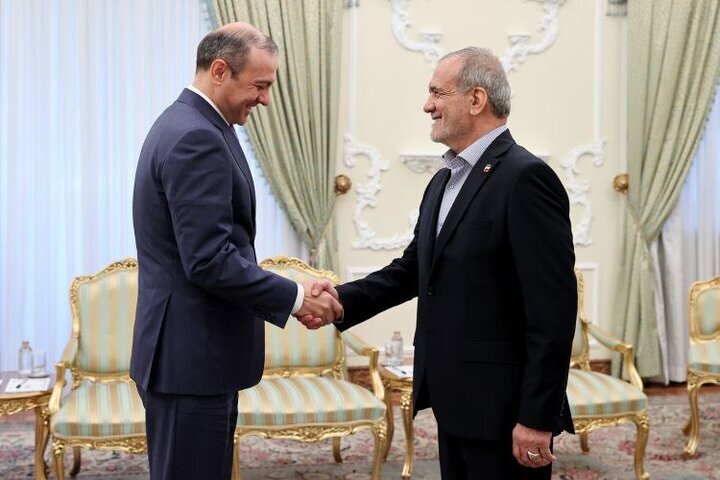Pezeshkian tells Armenia foreign powers should not be allowed to undermine ties

TEHRAN – President Masoud Pezeshkian has stressed that Iran and Armenia must not allow any foreign power to undermine their friendly and strategic relations, urging closer cooperation in both political and economic fields.
The Iranian president made the remarks on Saturday during a meeting in Tehran with Armen Grigoryan, Secretary of Armenia’s National Security Council.
Pezeshkian voiced concern over the recent U.S.-brokered peace deal between Armenia and Azerbaijan, which includes plans for a transport corridor across Armenia’s southern Syunik province to connect Azerbaijan with its exclave of Nakhchivan. Iran has long opposed the project, warning that it could alter the geopolitical balance of the South Caucasus and restrict Tehran’s access to regional transport routes.
The president, however, said some of Tehran’s concerns had been alleviated following assurances provided by Armenian officials. He recalled his “fruitful” visit to Yerevan in August, where the two sides reached “positive agreements,” and welcomed progress in the implementation of the International North-South Transport Corridor (INSTC).
The INSTC is a 7,200-kilometer multimodal network linking Iran with Central Asia, India, Russia, and Europe. Pezeshkian underlined that once completed, the project would not only strengthen regional trade but also foster greater political and economic convergence within the Eurasian Economic Union.
He further called for deeper trade and investment ties with Yerevan to expand bilateral economic exchanges.
For his part, Grigoryan hailed Pezeshkian’s visit to Armenia as a turning point in relations and reiterated his country’s readiness to sign a comprehensive cooperation agreement with Iran. He also voiced hope that Armenian infrastructure and development projects would be carried out with the participation of Iranian companies, stressing that Armenia is prepared to multiply its trade volume with Tehran several times over.
Iran opposed to any geopolitical changes in Caucasus: top security chief
Earlier in the day, Grigoryan held talks with Secretary of Iran’s Supreme National Security Council Ali Larijani, who reiterated Tehran’s opposition to any move that would bring about geopolitical changes in the Caucasus. Larijani instead welcomed Armenia’s inclusion in the INSTC, which connects Iran’s northern neighbors to the Sea of Oman.
“Iran has always supported the independence and resilience of regional countries as the basis for lasting security,” Larijani said, voicing support for continued peace talks between Yerevan and Baku.
Grigoryan, in turn, underlined Armenia’s commitment to national sovereignty, territorial integrity, inviolability of borders, and reciprocity in international relations. He assured Tehran that Armenia’s sovereignty over security, military, and customs issues had been preserved in its agreements with Azerbaijan, and pledged that ties with Iran would remain unaffected.
U.S. presence a threat to stability in the Caucasus: Iran’s military chief
Meanwhile, Iran’s military chief, Major General Abdolrahim Mousavi, also met with the Armenian official.
Speaking in Tehran, Mousavi said Iran welcomes peace initiatives between Armenia and Azerbaijan, but stressed that foreign intervention would only complicate regional disputes.
“A peace agreement between Armenia and Azerbaijan can bring lasting peace and security to the region, and the Islamic Republic of Iran always supports such processes,” Mousavi stated. “However, the presence of foreign powers, including the United States, is a matter of serious concern for the Caucasus.”
The top commander emphasized that “historical realities confirm the negative role played by the United States in the region,” urging the creation of effective mechanisms to prevent tensions from escalating under the influence of outside powers.
Mousavi’s remarks reflect Iran’s longstanding position that regional issues should be resolved by regional states themselves, without the involvement of external actors. Tehran has repeatedly cautioned that U.S. and NATO-backed initiatives could undermine sovereignty, fuel divisions, and shift the delicate geopolitical balance in the South Caucasus.
For his part, Grigoryan referred to Armenia’s August 8 agreements with Azerbaijan under the “Crossroads of Peace” initiative. He stressed the importance of safeguarding Armenia’s sovereignty over the Syunik corridor — the sensitive strip of land bordering Iran — and assured that Yerevan seeks to prevent any negative impact on relations with Tehran.
Leave a Comment